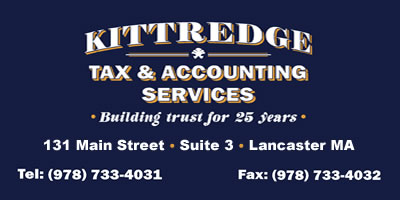Client Services
Online Appointment Scheduling

Credit cards accepted
Professional Associations and Certifications
Choosing a Business Entity
Kittredge Tax and Accounting Services can help you decide which form of business is the most advantageous and can provide the monthly and annual service to accurately and legally report business profits and losses.
Sole Proprietorships
Is an unincorporated organization composed of one person who carries on a trade or business to which he contributes money, property, labor or skills and expects to make a profit from the activity.
Pros:
- Simple to form and operate
- Owner is free to make all decisions
- Profits taxed at the individual level (schedule C or F)
- Easy to discontinue
Cons:
- Unlimited personal liability
- Only one person can own
- Difficult to raise capital
- Business ends upon owner’s death
- Limited owner fringe benefits
- Self employment taxes
- Cumbersome transfer of ownership
Partnerships
A partnership is one step up from a sole proprietorship. A partnership is an unincorporated organization that conducts a business, financial or investment venture. Technically, a partnership exists when two or more people agree to contribute money, property, labor or skills and each expects to share in the profits and losses.
Pros:
- Easy to form and maintain
- Unlimited number of business owners
- Flexible partnership arrangements with special tax allocations
- Tax-free contributions to and distributions from the partnership
- Profits taxed at the individual level (form 1065)
Cons:
- Each partner has unlimited personal liability for all debts
- Partner disputes are common
- Lack of flexibility to select fiscal year
- Life of partnership is limited to the life of the partners
- Earnings subject to self employment tax
- Partner’s taxed on profits even if not distributed
- Unfavorable tax treatment of partner fringe benefits
- Sale of partner interest may be restricted by partnership agreement
Limited Liability Companies
LLC’s are a special type of partnership existing under state law. They function like a limited partnership in that all partner’s, called “members”, are limited partners; they also have no general partners. Thus, an LLC combines the advantages of a corporation (limited liability to all owners) with the advantages of a partnership (single-level taxation), while avoiding limitations on ownership and single class of stock rules, characteristics of an S corporation.
Pros:
- Unlimited number of members
- All members have limited liability
- All members have right to participate in management
- Single-level taxation, pass-through profits and losses (Form 1065)
- Can have different classes of ownership
- Not subject to SE tax
Cons:
- Organizational and operating requirements differ from state to state
- State tax treatment may not follow federal tax treatment
- Lack of legal precedents regarding LLC’s
- Transfer on interests difficult
- Many states levy a franchise tax
- Some industries or activities not permitted
S Corporations
S status combines the legal environment of C corporations with taxation similar to that of partnerships. Treated as corporations under state law, S corporations are recognized as a separate legal entity and provide shareholders with the same liability protection enjoyed by C corporations. S corporations avoid the double taxation of a C corporation with the pass through of income and expenses to shareholders, like a partnership, and a single level of taxation.
Pros:
- No corporate double taxation
- Pass through tax items to shareholders (Form 1120S)
- Pass through net operating losses to shareholders
- No personal holding or accumulated earnings tax
- No excessive compensation issues for employee/shareholders
- No corporate AMT
- Unfavorable person service corporation rules don’t apply
- Tax free withdrawals of equity to the extent of basis
- Capital gain treatment upon sale of stock
Cons:
- Unfavorable fringe benefit treatment of >2% shareholder
- Generally required to use calendar year
- Only one class of stock
- Pass through losses limited to shareholder basis
- No tax-free liquidation
- Complicated rules, guidelines and regulations
- Number of shareholders limited to 100
C Corporations
C corporations are entities formed under state law. They are legally viewed as an artificial person created for the purpose of conducting business. As such, they can hire employees, enter into contracts and buy assets. Therefore, the corporation and its shareholders are separate taxable entities.
Pros:
- Liability protection
- Graduated tax rate schedule (Form 1120)
- Entity has an indefinite life
- Transferability of ownership
- Access to all the tax favored fringe benefits for employee/shareholder
- Flexibility to select fiscal year
- Deductibility of losses in full
- Corporate form provides vehicle for capital raising through widespread stock ownership
Cons:
- Impose the greatest administrative burden
- Cost of incorporation can be substantial
- Stockholder disputes are common
- Double taxation of corporate earnings
- Taxable liquidating and appreciated property distributions
- Subject to AMT
- Subject to personal holding and accumulated earnings penalty taxes
Home | Business Services | Tax Preparation | Why Us? | Resources | Tax Tips | Location | About Us | Contact Us
Serving Berlin MA, Bolton MA, Boylston MA, Clinton MA, Harvard MA, Hudson MA, Lancaster MA, Leominster MA, Shrewsbury MA, Sterling MA, West Boylston MA, and Worcester MA





